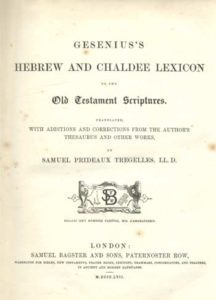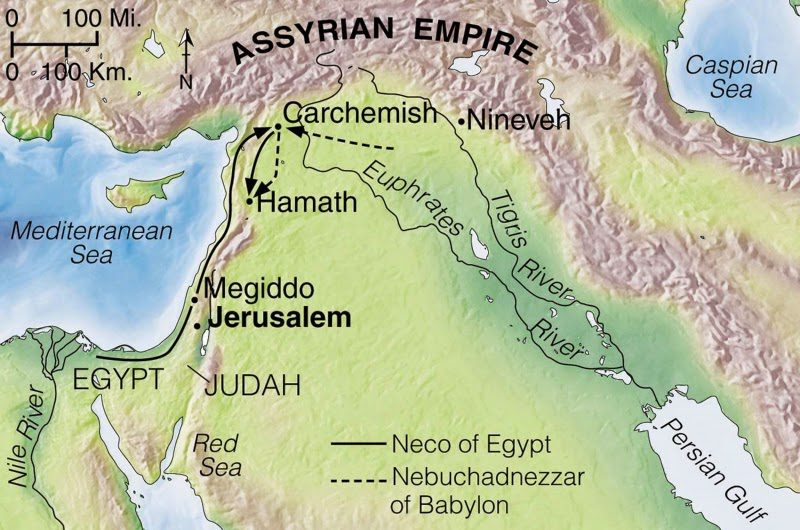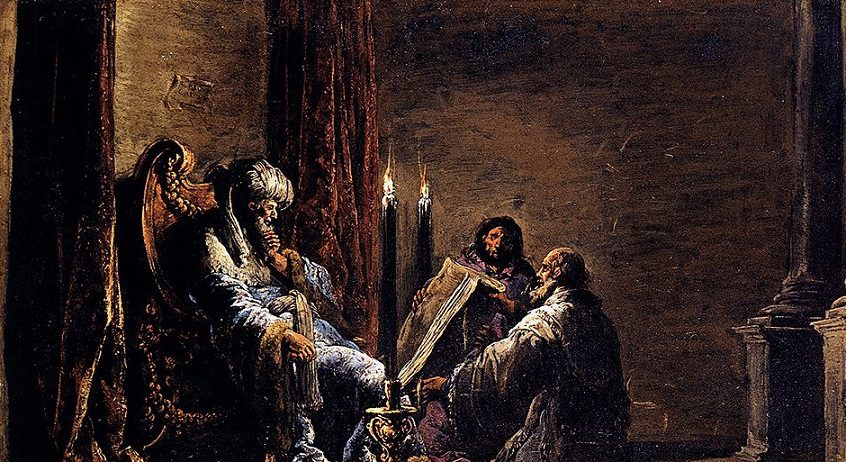We recently observed one of the falls of Jerusalem in the Lamentations of the prophet Jeremiah. Now we look further back in time to the king who almost restored Israel before its fall, King Josiah of Judah.
Scripture summarizes the reins of so many kings, ‘He did evil in the sight of the Lord,’ but Josiah was not one of these.
Looking back
As our dreams die with a leader in whom we had placed our hope we ask, ‘where did we go wrong?’
It would be easy enough to place blame on one administration as we so often accuse, but in fact we cause failure by our own disobedience in every generation. Many who take credit for success have no right to defer blame for failure. Nevertheless, let’s take a quick look at a few kings of Judah.
Fall of Jerusalem in 586 BC
“For because of the anger of the LORD this happened in Jerusalem and Judah, that He finally cast them out from His presence.”
2 Kings 24:20
Jerusalem was under siege for many long months as the food ran out and disease and starvation spread throughout the city. On July 10, 586 B.C. The Babylonian forces of king Nebuchadnezzar broke through the northern wall of Jerusalem.
The fall of Israel and Judah began with their division at Solomon’s death many years earlier. Many kings did evil, yet listen to this high praise for King Hezekiah of Judah, a predecessor of Josiah.
Hezekiah
Hezekiah relied on the LORD God of Israel; not one of the kings of Judah was like him, either before him or after him.
2 Kings 18:5 CSB
The Book of Kings was written after the Beginning of the Captivity in Babylon Observe also the historical view of Israel, compared to Hezekiah’s leading of Judah as the author records events of both kingdoms.
Hezekiah rebelled against the king of Assyria… (early 700’s B.C.)
9 In the fourth year of King Hezekiah, which was the seventh year of Israel’s King Hoshea son of Elah, Assyria’s King Shalmaneser marched against Samaria and besieged it.
Three years later Shalmaneser captured Samaria.
11 The king of Assyria deported the Israelites to Assyria… 12 because they did not listen to the LORD their God but violated his covenant — all he had commanded Moses the servant of the LORD. They did not listen, and they did not obey.
Not so unlike the later deportation of the residents of Judah and Jerusalem to Babylon.
Hezekiah reigned over Judah for nearly three decades as a good King. Except for sixteen years under his immediate predecessor, Ahaz, Judah had prospered under good kings for nearly two centuries.
This would not be the case for Josiah’s two predecessors, who succeeded Hezekiah and did evil in the sight of the Lord for fifty-seven years.
Josiah
We turn now not only to Josiah, a king of Judah who did many good things, but also to the perspective of the Chronicles, written after the Return from Babylon and Persia. You may read a similar account of Josiah’s reign beginning in 2 Kings 22.
The common people killed all who had conspired against King Amon, and they made his son Josiah king in his place.
2Chr 33:25
2 Chronicles 34
… He did what was right in the Lord’s sight and walked in the ways of his ancestor David; he did not turn aside to the right or the left.
… and in the twelfth year he began to cleanse Judah and Jerusalem of the high places… 6 He did the same in the cities of Manasseh, Ephraim, and Simeon, and as far as Naphtali… 8 In the eighteenth year of his reign, in order to cleanse the land and the temple, Josiah sent [officials] to repair the temple of the Lord his God.
… the priest Hilkiah found the book of the law of the Lord written by the hand of Moses.
15 Consequently, Hilkiah told the court secretary Shaphan, “I have found the book of the law in the Lord’s temple,” and he gave the book to Shaphan. 16 Shaphan took the book to the king…
This significant event, result of Josiah’s desire to restore the Temple, shows us at least two important facts. The Torah in the Temple was preserved in the hand of Moses. And secondly, the Law of Moses had not been read or observed in previous administrations of kings who did evil in the sight of the LORD.
National Repentance
19 When the king heard the words of the law, he tore his clothes.
Josiah demonstrates leadership in bowing down to the Lord, by repenting on behalf of Judah and Israel for their continual disobedience to the Lord God. He had not intentionally sinned, but the Law had no longer governed the actions of the governed.
21 “Go and inquire of the Lord for me and for those remaining in Israel and Judah, concerning the words of the book that was found.
For great is the Lord’s wrath that is poured out on us because our ancestors have not kept the word of the Lord in order to do everything written in this book.”
2 Chronicles 34:21b
Do our national leaders consider the wrath of the Lord when our laws overturn God’s rule?
Consequence to disobedience
Josiah had done good, but it was not enough to save his nation from punishment. The Law of the Lord and its punishment would prevail.
24 ‘This is what the Lord says:
I am about to bring disaster on this place and on its inhabitants, fulfilling all the curses written in the book that they read in the presence of the king of Judah, 25 because they have abandoned me…
26 Say this to the king of Judah [Josiah] who sent you to inquire of the Lord: ‘This is what the Lord God of Israel says:
As for the words that you heard, 27 because your heart was tender and you humbled yourself before God when you heard his words against this place and against its inhabitants, and because you humbled yourself before me, and you tore your clothes and wept before me, I myself have heard’—this is the Lord’s declaration. 28 ‘I will indeed gather you to your fathers, and you will be gathered to your grave in peace.
Your eyes will not see all the disaster that I am bringing on this place and on its inhabitants.’”
The Lord’s Covenant Confirmed
Josiah, knowing that Jerusalem will fall in a later generation, reaffirms the people’s oath to the Lord and His Law.
He read in their hearing all the words of the book of the covenant that had been found in the Lord’s temple. 31 Then the king stood at his post and made a covenant in the Lord’s presence to follow the Lord and to keep his commands, his decrees, and his statutes with all his heart and with all his soul in order to carry out the words of the covenant written in this book.
פֶּסַח
peçach, peh’-sakh, passover
35 וַיַּ֨עַשׂ יֹאשִׁיָּ֧הוּ בִֽירוּשָׁלִַ֛ם פֶּ֖סַח לַיהוָ֑ה וַיִּשְׁחֲט֣וּ הַפֶּ֔סַח בְּאַרְבָּעָ֥ה עָשָׂ֖ר לַחֹ֥דֶשׁ הָרִאשֽׁוֹן׃
Josiah observed the Lord’s Passover and slaughtered the Passover lambs on the fourteenth day of the first month.
2 Chronicles 35:1 CSB [Hebrew text of WLC above]

According to definition of peçach or passover from Gesenius’ Hebrew-Chaldee Lexicon: “a sparing, immunity from penalty and calamity, hence —
(1) a sacrifice offered on account of the sparing of the people, the pascal lamb, of which it is said, “this is the sacrifice of sparing unto Jehovah, who passed over the houses of the children of Israel in Egypt, when he smote the Egyptians. Hence, to kill the pascal lamb… to eat the passover… to prepare the sacrifice of passover.
(2) the day of the passover the fourteenth day of the month of Nisan, which was followed by seven days of the feast of the unleavened bread
Josiah offers a passover lamb to the Lord.
Spare us from the penalty we deserve. Accept our sacrifice as immunity from this penalty and calamity which is to come upon us.
11 וַֽיִּשְׁחֲט֖וּ הַפָּ֑סַח וַיִּזְרְק֤וּ הַכֹּהֲנִים֙ מִיָּדָ֔ם וְהַלְוִיִּ֖ם מַפְשִׁיטִֽים׃
11 Then they slaughtered the Passover lambs, and while the Levites were skinning the animals, the priests splattered the blood they had been given.
Josiah Killed
Will the Lord spare you? (For you have trespassed his Law.)
Though Josiah reformed Judah and a faithful remnant of Israel, he died as victim of a battle with an enemy.
It was about 610 years Before Christ, two dozen years before the fall of Jerusalem and nearly a century before the rebuilding of the second Temple by Zerubbabel and others.
2 Chronicles 35:20-27

20 After all this that Josiah had prepared for the temple, King Neco of Egypt marched up to fight at Carchemish by the Euphrates, and Josiah went out to confront him.
21 But Neco sent messengers to him, saying,
“What is the issue between you and me, king of Judah? I have not come against you today but I am fighting another dynasty…
Jerusalem, Judah and Israel lie between the powers of the African continent to the south and west, and Asia to the north and east. Their kings could be either strategic allies or become annexed as subjugated states.
King Josiah goes out to fight, realizing the potential threat of the powerful king of Egypt. Judah certainly would not want to be once again enslaved by the powerful Egyptians. Yet hear King Neco’s plea not to oppose him against the powerful Assyrians.
“… God told me to hurry. Stop opposing God who is with me; don’t make him destroy you!”
22 But Josiah did not turn away from him; instead, in order to fight with him he disguised himself.
To be clear, the Egyptian King is invoking the Name of ‘elohiym. אֱלֹהִים
Josiah, rather than leading his troops against Neco, disguises himself as an ordinary battlefield soldier.
He did not listen to Neco’s words from the mouth of God, but went to the Valley of Megiddo to fight. 23 The archers shot King Josiah…
An Ordinary Death
24 So his servants took him out of the war chariot, carried him in his second chariot, and brought him to Jerusalem. Then he died, and they buried him in the tomb of his fathers. All Judah and Jerusalem mourned for Josiah.
2Ki 22:1 Josiah was eight years old when he became king, and he reigned thirty-one years in Jerusalem… 3 In the eighteenth year of King Josiah, the king sent the court secretary Shaphan son of Azaliah, son of Meshullam, to the LORD’s temple… When the king heard the words of the book of the law, he tore his clothes… 2Ki 23:23 But in the eighteenth year of King Josiah, the LORD’s Passover was observed in Jerusalem.
From Megiddo his servants carried his dead body in a chariot, brought him into Jerusalem, and buried him in his own tomb.
2Ki 23:30
Josiah was killed in battle at the age of about thirty-eight or thirty-nine, about six hundred years Before Christ. Jerusalem and Judah would fall in defeat just a generation later than Josiah and again just two generations after Christ.
A not so ordinary passover
“…this is the sacrifice of sparing unto Jehovah, who passed over the houses of the children of Israel in Egypt, when he smote the Egyptians.
Jesus sent Peter and John, saying, “Go and make preparations for us to eat the Passover.”
Luke 23:8 CSB
“You’re not considering that it is to your advantage that one man should die for the people rather than the whole nation perish.”
Caiaphas, HIgh Priest of Israel
In our next look at the Passover we will examine the Pascal Lamb, sacrificed for us.
To be continued... [Festival of the Passover]


Leave a Reply